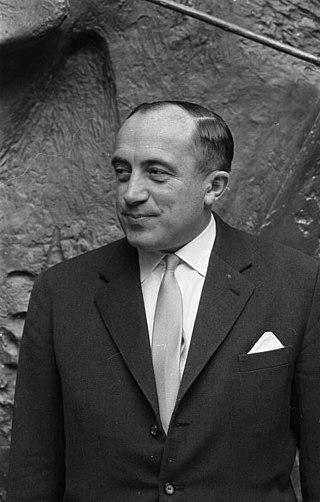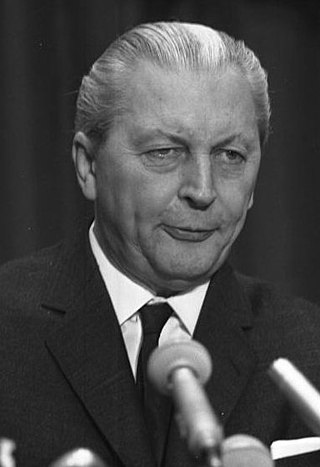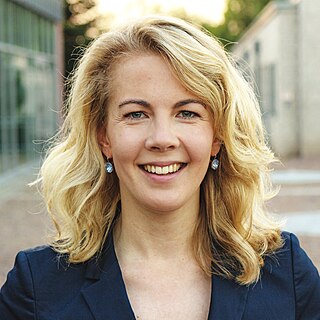
The Free Democratic Party is a liberal political party in Germany.

Ludwig Wilhelm Erhard was a German politician and economist affiliated with the Christian Democratic Union (CDU), and chancellor of West Germany from 1963 until 1966. He is known for leading the West German postwar economic reforms and economic recovery in his role as Minister of Economic Affairs under Chancellor Konrad Adenauer from 1949 to 1963. During that period he promoted the concept of the social market economy, on which Germany's economic policy in the 21st century continues to be based. In his tenure as Chancellor, however, Erhard lacked support from Adenauer, who remained chairman of the party until 1966, and failed to win the public's confidence in his handling of a budget deficit and his direction of foreign policy. His popularity waned, and he resigned his chancellorship on 30 November 1966.

The Christian Democratic Union of Germany is a Christian democratic centrist and liberal conservative political party in Germany. It is the major catch-all party of the centre-right in German politics.

Walter Scheel was a German statesman. A member of the Nazi Party that joined the Free Democratic Party of Germany (FDP) in 1946, he first served in government as the Federal Minister of Economic Cooperation and Development from 1961 to 1966 and later as President of Germany from 1974 to 1979. He led the FDP from 1968 to 1974.
The social market economy, also called Rhine capitalism, Rhine-Alpine capitalism, the Rhenish model, and social capitalism, is a socioeconomic model combining a free-market capitalist economic system alongside social policies and enough regulation to establish both fair competition within the market and generally a welfare state. It is sometimes classified as a regulated market economy.

Federal elections were held in West Germany on 28 September 1969 to elect the members of the 6th Bundestag. The CDU/CSU remained the largest faction and the Social Democratic Party remained the largest single party in the Bundestag, winning 237 of the 518 seats. After the election, the SPD formed a coalition with the Free Democratic Party and SPD leader Willy Brandt became Chancellor.

Federal elections were held in West Germany on 19 September 1965 to elect the members of the 5th Bundestag. The CDU/CSU remained the largest faction, while the Social Democratic Party remained the largest single party in the Bundestag, winning 217 of the 518 seats.

Federal elections were held in West Germany on 17 September 1961 to elect the members of the fourth Bundestag. CDU/CSU remained the largest faction, winning 242 of the 499 seats.

Erich Mende was a German politician of the Free Democratic Party (FDP) and Christian Democratic Union (CDU). He was the leader of FDP from 1960 to 1968 and the vice-chancellor of West Germany from 1963 to 1966.

Werner Dollinger was a German politician and economist, a member of the Christian Social Union in Bavaria (CSU). He served as Federal Minister for the Treasury from 1962 to 1966, Federal Minister for Economic Cooperation in 1966, Federal Minister for Post and Telecommunications from 1966 to 1969, and as Federal Minister of Transport from 1982 to 1987.
Grand coalition is a term in German politics describing a governing coalition of the parties Christian Democratic Union (CDU) along with its sister party the Christian Social Union of Bavaria (CSU) and the Social Democratic Party (SPD), since they have historically been the major parties in most state and federal elections since 1949. The meaning of the term may change due to the growth of some formerly minor parties in recent years.

The First Adenauer cabinet was the 1st Government of Federal Republic of Germany in office from 20 September 1949 until 20 October 1953. It was the first democratically-elected German cabinet after World War II. The cabinet was formed after the 1949 elections. Konrad Adenauer reached an agreement on a coalition with the Free Democratic Party (FDP), German Party (DP) and his Christian Democratic Union (CDU) together with their Bavarian sister party Christian Social Union (CSU), setting the stage for Adenauer to become the first Chancellor of Germany. Franz Blücher (FDP) served as Vice-Chancellor of Germany and Federal Minister of Matters of the Marshall Plan. The cabinet was succeeded by the Second Adenauer cabinet.

The Second Merkel cabinet was the Government of the Federal Republic of Germany during the 17th legislative session of the Bundestag. Installed after the 2009 federal election, it left office on 17 December 2013. It was preceded by the first Merkel cabinet and succeeded by the third Merkel cabinet. Led by Chancellor Angela Merkel, it was supported by a coalition of the Christian Democratic Union (CDU), the Christian Social Union of Bavaria (CSU), and the Free Democratic Party (FDP).

Werner Hoyer is a German economist and politician of the Free Democratic Party (FDP) who served as President of the European Investment Bank (EIB) between 2012 and 2023.

Johann Baptist Gradl, was a German politician and member of the Christian Democratic Union.

The Kiesinger cabinet was the 8th Government of the Federal Republic of Germany from 1 December 1966 to 22 October 1969 throughout the 5th legislative session of the Bundestag. It was led by the Christian Democratic Union's Kurt Georg Kiesinger, a former Nazi Party member. The Bundestag that had been chosen in the September 1965 election initially resulted in the Cabinet Erhard II, but when the Free Democratic Party resigned from the government, that led to the formation of the new cabinet. The cabinet was supported by the first grand coalition between the Christian Democratic Union (CDU), Christian Social Union of Bavaria (CSU) and the Social Democratic Party (SPD). The Vice-Chancellor was Willy Brandt (SPD)

The Second Erhard cabinet was the government of Germany between 26 October 1965 and 30 November 1966. Led by the Christian Democratic Union Ludwig Erhard, the cabinet was a coalition between the Christian Democratic Union (CDU) and the Free Democratic Party (FDP).

The Fourth Adenauer cabinet was formed by incumbent Chancellor Konrad Adenauer after the 1961 federal election. The cabinet was sworn in on 14 November 1961.

Linda Teuteberg is a German lawyer and politician of the Free Democratic Party (FDP). Serving as a member of the Bundestag since 2017, she was elected as General Secretary of the FDP on 26 April 2019 and thereby became part of the party's leadership around chairman Christian Lindner. Lindner asked for and received her resignation effective 19 September 2020.

Ernst Lemmer was a German politician of the Christian Democratic Union (CDU) and former member of the German Bundestag.
















